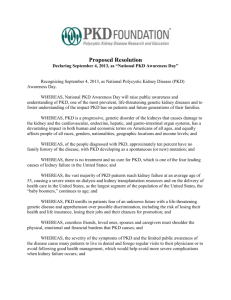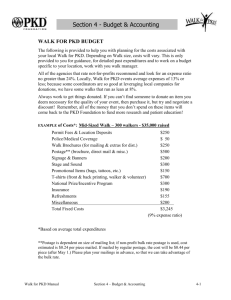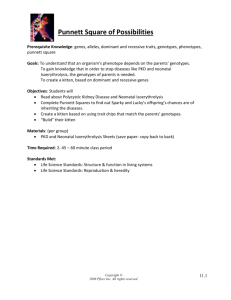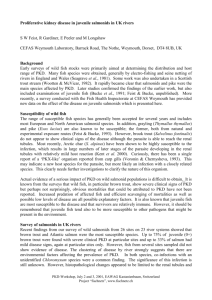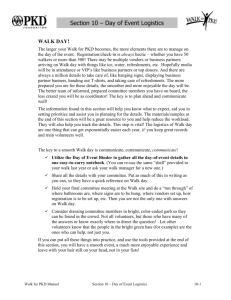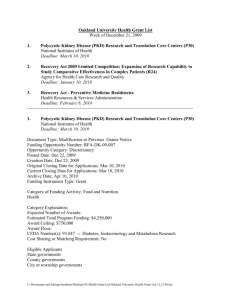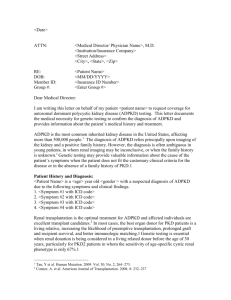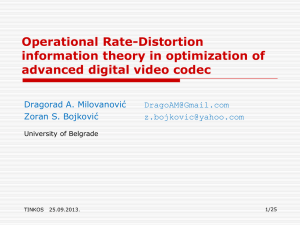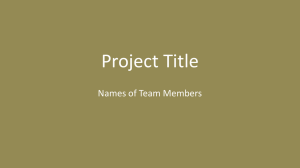public relations
advertisement
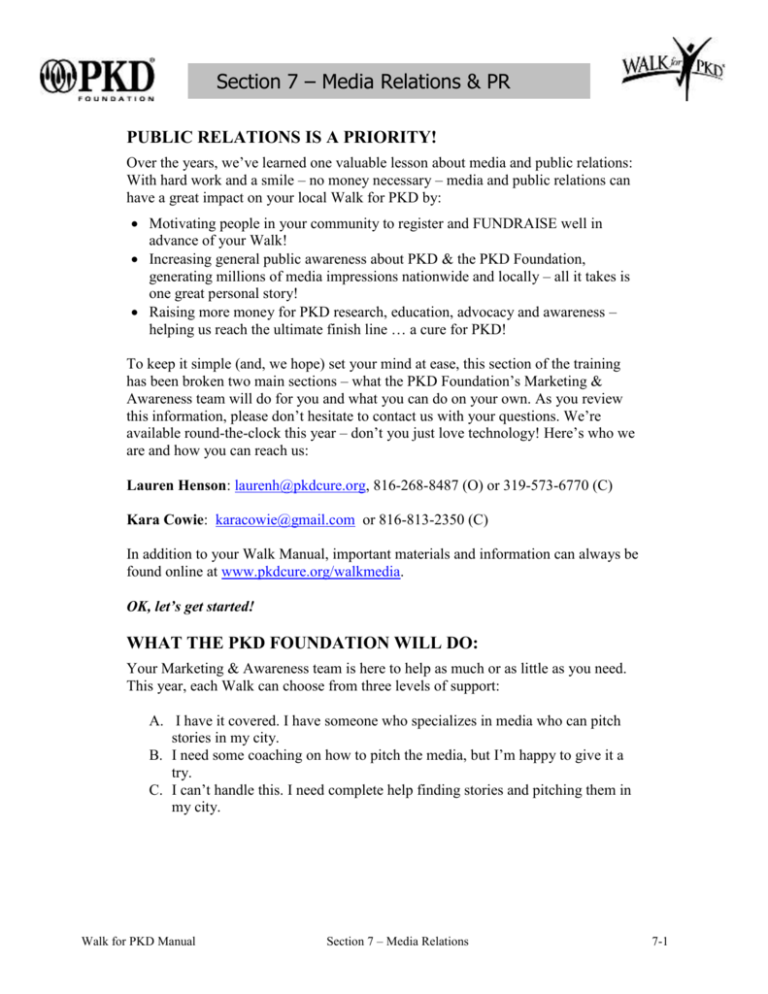
Section 7 – Media Relations & PR PUBLIC RELATIONS IS A PRIORITY! Over the years, we’ve learned one valuable lesson about media and public relations: With hard work and a smile – no money necessary – media and public relations can have a great impact on your local Walk for PKD by: Motivating people in your community to register and FUNDRAISE well in advance of your Walk! Increasing general public awareness about PKD & the PKD Foundation, generating millions of media impressions nationwide and locally – all it takes is one great personal story! Raising more money for PKD research, education, advocacy and awareness – helping us reach the ultimate finish line … a cure for PKD! To keep it simple (and, we hope) set your mind at ease, this section of the training has been broken two main sections – what the PKD Foundation’s Marketing & Awareness team will do for you and what you can do on your own. As you review this information, please don’t hesitate to contact us with your questions. We’re available round-the-clock this year – don’t you just love technology! Here’s who we are and how you can reach us: Lauren Henson: laurenh@pkdcure.org, 816-268-8487 (O) or 319-573-6770 (C) Kara Cowie: karacowie@gmail.com or 816-813-2350 (C) In addition to your Walk Manual, important materials and information can always be found online at www.pkdcure.org/walkmedia. OK, let’s get started! WHAT THE PKD FOUNDATION WILL DO: Your Marketing & Awareness team is here to help as much or as little as you need. This year, each Walk can choose from three levels of support: A. I have it covered. I have someone who specializes in media who can pitch stories in my city. B. I need some coaching on how to pitch the media, but I’m happy to give it a try. C. I can’t handle this. I need complete help finding stories and pitching them in my city. Walk for PKD Manual Section 7 – Media Relations 7-1 Section 7 – Media Relations & PR Depending on which level of support you choose, we’ll step in to provide: I have it covered. I have someone who specializes in media who can pitch stories in my city. If you chose Level A, congratulations, you’re obviously comfortable working with the media. Still, we’re here for you anytime you need us. In addition to one-on-one support, as needed, here’s what you’ll get from us: Customized news release including at least one patient story from a community near your Walk, if we have one. If we don’t have a patient story from your community, please help us out by encouraging patients in your community to share their stories. The share your story form is available at www.pkdcure.org/walkmedia. Customized media list, including newspaper, TV and radio for your market. Hard copies of the media kit, which includes your customized news release, media list and a PKD fact sheet for the media. Electronic copies of the media kit, available at www.pkdcure.org/walkmedia. A conference call training on “pitching the media” this summer. Round-the-clock support from the Marketing & Awareness team if you should need help pitching a story, working with a reporter, etc. I need some coaching on how to pitch the media, but I’m happy to give it a try. You may have some experience working with the media, and you’re willing to give it a go. Don’t worry – you’ll do fine. The media prefers to hear from a local community member, and we’re here to make sure you have the materials and support you need. Customized news release including at least one patient story from a community near your Walk, if we have one. If we don’t have a patient story from your community, please help us out by encouraging patients in your community to share their stories. The share your story form is available at www.pkdcure.org/walkmedia. Customized media list, including newspaper, TV and radio for your market. Hard copies of the media kit, which includes your customized news release, media list and a PKD fact sheet for the media. Electronic copies of the media kit, available at www.pkdcure.org/walkmedia. A conference call training on “pitching the media” this summer. One-on-one, round-the-clock assistance pitching stories, working with the media, arranging interviews, coaching patients for interviews and more. Anything you need, let us know and we’re happy to step in to help just a bit or take over completely. Round-the-clock support from the Marketing & Awareness team. Walk for PKD Manual Section 7 – Media Relations 7-2 Section 7 – Media Relations & PR I can’t handle this. I need complete help finding stories and pitching them in my city. Whether you’re new to the Walk, working with the media or you just don’t have the committee support you need to take on media and PR, have no fear; your Marketing & Awareness team is happy to step in and handle our local media efforts from top to bottom. Although we’ll provide you with all the materials everyone else is receiving, you won’t need to worry quite as much about how they’re being used. It’s best to keep hold of everything though, especially come Walk day when you might need a few copies of the media kit or at least a news release to share with reporters. If we don’t have a patient story from your community, please help us out by encouraging patients in your community to share their stories. The share your story form is available at www.pkdcure.org/walkmedia. Customized media list, including newspaper, TV and radio for your market. Hard copies of the media kit, which includes your customized news release, media list and a PKD fact sheet for the media. Electronic copies of the media kit, available at www.pkdcure.org/walkmedia. A conference call training on “pitching the media” this summer, if you want to participate. Since you’ve selected not to pitch the media yourself, you can skip this training and leave it to us. Complete, round-the-clock, care from the Marketing & Awareness team. We’ll pitch the stories, arrange interviews, provide all coaching and more. You may be called up to be interviewed by the media or to help greet a reporter at a meeting, the Walk itself, etc., but our team will handle all the details. Regardless of the level of support you choose, your Marketing & Awareness team is always here to help. Please feel free to contact us anytime via cell or email. We’ll make sure and communicate regularly with your Walk Managers, and we promise to do our absolute best to raise awareness and encourage fundraising in your local Walk community! WHAT WE’LL DO ON A NATIONAL LEVEL In addition to helping or doing all the pitching for your local Walks, we’ll also be working on national media through two incredibly effective tools: 1. PR Newswire – Through this service, we’ll send 1-2 news releases out to media nationwide about the Walk. With our latest news release on PR Newswire, 909 media outlets across the country picked up the story/release. 2. Bloggers/Online Contacts – We’ll also be pushing out to all the PKD bloggers and online contacts we’ve made over the past few years. These contacts are very receptive to new information for the PKD community and should be willing to help promote the Walk. Walk for PKD Manual Section 7 – Media Relations 7-3 Section 7 – Media Relations & PR WHAT YOU CAN DO: Now that you know what we’ll do for you, if you’ve chosen to approach the media completely on your own or with our support, here’s some valuable information you may want to review. A BETTER UNDERSTANDING OF THE MEDIA Members of the media work in a fast-paced environment and under strict deadlines. We have to work with them on their terms; meaning we must adjust our schedules to meet their needs. It is important to return correspondence (most frequently emails and phone calls) as quickly as possible. Because news can change quickly, one story can easily replace another. Stories and interviews about the Walk for PKD are subject to breaking news, time constraints and other external factors. Big, breaking stories are most likely to get coverage and will pull the media attention away from smaller, more feel-good stories like events. Even the best laid plans can take a new direction at any time. But remember, the BEST coverage of your event comes before the day of the walk. You want people to know in advance about the walk, PKD and their opportunity to help. A reporter or photographer who shows up on the day of the walk is secondary. Still, despite their hectic schedules and deadlines, news outlets are always looking for compelling, human interest stories. That’s why it’s extremely important to find patients willing to share their stories in every Walk market. Remember, the share your story form is available online at www.pkdcure.org/walkmedia. In our experience, it’s much more effective to pitch a story about a PERSON than an EVENT. If you pique their interest with the personal feature story, you can always weave in the messaging about the Walk itself. CONTACTING OR “PITCHING” THE MEDIA There are a variety of ways to “pitch” your story to the media. Regardless, do what makes you feel the most comfortable and be confident – you do have an important story to tell, and the media loves hearing from local community members! And remember – you’ll probably need to put in a little grunt work here, emailing, calling, even stopping by the newsroom to get their attention. Don’t be discouraged – it’ll be worth it to see a nice article promoting your Walk! We recommend calling and/or emailing at least three times before giving up on a particular contact. Know someone personally? Always contact them first. If not … Walk for PKD Manual Section 7 – Media Relations 7-4 Section 7 – Media Relations & PR Get out your media list! We’ll include telephone, fax and email contacts for newspapers, TV and radio stations in your market. If you lose the hard copy we mail you, you can find your media list at www.pkdcure.org/walkmedia. Begin with an email. Make sure to include the news release as an attachment and in the e-mail text to assure it arrives. Many media outlets will block attachments from their e-mail systems. Also, make sure your email is personalized! Do not send a mass email out to all media outlets in your community. Personalize each one so the reporter is greeted by name! Follow up with a phone call. Emails are easy to read – and easy to ignore! Sometimes you just need to pick up the phone and call. This takes time, but it’s worth it. Sometimes, you can fax if a particular reporter prefers that method, but you need to ask and be sure they are expecting your fax. Newsrooms receive thousands of faxes each day and most are thrown away without a second glance. U.S. Mail is another option, but it is slow, expensive and can get lost in the deluge of other mail. If you mail a media kit, follow up with a call and email. Nervous about calling the media? Worried they’ll turn you down or cut the conversation short? Here are a few questions – a sample script of sorts – you can use to keep the conversation going and hopefully secure advance coverage! I’m calling about the 2010 (CITY NAME) ________ Event: Have you received news release which was sent via email? Is this the type of story or event you’d cover? If not, would you cover local research or patients participating in clinical trials, etc… what is your specific interest for future story pitches? Can you pass along event information to assignment desk for coverage on the day of the event? Do you profile patients or people in your local area who could benefit from such an event? Can I share information over the phone or via email regarding local patient(s) who are willing to share their story? Are there other opportunities such as an interview segment on noon or morning newscast or community affairs program to preview an event such as the Walk for PKD? Are you the contact for this opportunity? If not, who should I reach out to? When is a good time to check back with you in case you might have an opportunity closer to the event? Walk for PKD Manual Section 7 – Media Relations 7-5 Section 7 – Media Relations & PR INTERVIEW TIPS You’ve made the call, and now you or someone else in your community has an interview! Congratulations! Here are a few interview tips: Be prepared. Decide what key messages you want to get across prior to the interview. Make sure to include these three points: - Why you walk – your personal story - Why it’s important – you will raise funds and awareness to fight PKD - A call to action – provide the website (www.pkdcure.org) and encourage people to register and fundraise If a reporter calls you out of the blue, don’t feel compelled to speak to the reporter that moment. It is fine for you to ask what information they need and offer to call them back at a mutually agreeable time before the reporter’s deadline. For television interviews, look at the reporter, not the camera. Smile. For radio interviews, turn off the radio and your computer. Have notes in front of you. Smile. Do your homework. Think about what is important to the reporter’s audience and review the Media Messages. Anticipate questions you may be asked, such as: - Why are you participating? - How has PKD affected your life? - How much money have you raised, and how have you raised your money? - Where does the money go? - How can someone help support the Walk for PKD? Be honest. If you don’t know the answer to a question, just say so. Confidently saying “I don’t know” is appreciated by the reporter. If it is a phone interview, tell the reporter you will try to find the requested information and get back with him or her at an appropriate time. Don't say anything "off the record" – assume anything you say will be used. Be friendly. Try to develop some rapport and call the reporter by his or her first name. Introduce yourself to the photographer and crew (television studio). Speak clearly and slowly. Be enthusiastic and confident. Have fun! Walk for PKD Manual Section 7 – Media Relations 7-6 Section 7 – Media Relations & PR NEWS STORY VS. PUBLIC SERVICE ANNOUNCEMENTS When you pitch the media, you can push for a news story and/or a public service announcement (PSA). Both are free and both generate excellent awareness of the Walk, but they’re quite different. Don’t know the difference between the two? Here’s what you need to know: News Stories: You’ll pitch a news story with your customized news release. This will focus on at least one patient (we hope!) in your community, who has been personally affected by PKD. If you’d like to send out additional news alerts/news releases, here are some examples: Early on, send a release announcing your appointment as walk coordinator Book a large sponsor? Send a release announcing the partnership Invite popular local radio DJs and/or TV personalities to participate and compete for who can raise the most money. Invite local radio DJ or TV personality to stand on a billboard or some other “stunt” to raise money for the Walk for PKD. Send a copy of the latest PKD research information to key local health writers with the Walk for PKD press release. Pitch interviews with a media savvy doctor to discuss the latest in PKD research. Have a local celebrity lead the walkers in pre-event warm up exercises. Pitch media on human-interest angle featuring children and families with PKD that are walking, oldest and youngest walkers. Pitch media on importance of exercise in controlling aspects of PKD and tie it to the Walk for PKD. Pitch business angles. Local corporate involvement in the Walk for PKD employee teams competition, living with PKD at the workplace, etc. Competition angles. Have sponsor radio and/or television stations challenge other stations in the community to raise more money or have bigger teams. Do the same with the competitive business organizations – advertising agencies, retailers, malls, restaurants, etc. Headline: Competitors Agree on Fighting PKD. In addition to the news releases you’ve all be given, you may want to send out a calendar alert. Community Calendars can be an easy and effective way to get the word out about the Walk. Most local media outlets, newspapers, television stations, radio stations and all of their Web sites host community calendars. These calendars generally list local events. Some even list regional events. The best way to get your event posted on a community calendar is to send calendar alerts to the employees who are responsible to publishing the Walk for PKD Manual Section 7 – Media Relations 7-7 Section 7 – Media Relations & PR calendars at local media outlets. A calendar alert is a simple document that states the Ws of your event: o Who o What o When o Where o Why Public Service Announcements (PSAs): It costs money to buy “air time” on a radio or television station to run a commercial. When you provide a Public Service Announcement (PSA), you are requesting that they give you FREE air time. PSAs should not be sent to newsrooms. You should contact the media outlet to find out who handles PSAs. This is usually the community affairs department. The generic TV PSA is available for viewing on the website at www.pkdcure.org/walkmedia. You can watch it or share it with a media outlet, but they’ll likely need a hard copy on tape before they can air it. BETA copies of the TV PSA are available from the PKD Foundation. We do not send these out until you have a media commitment, because of the cost to duplicate. Once a TV outlet agrees to run the PSA, contact us and we’ll send you a copy. "Generic" versions of the radio PSA are available on the website. They can be tagged by a local personality, or you can rely on them going to the website to find out the date, time and location. Radio spots MUST be accompanied by a letter with information about the event. If you just send the PSA with no indication why the media should care, they will throw them out! You can also include scripts (some radio stations will want to have their own talent record the PSA’s. These scripts can be found on the website. Print PSAs will be available and can be customized through your Marketing & Awareness team. We will readily provide generic versions; each version will be available in color or black/white. o Contact your manager if you have print PSA placement and want to have the ad customized for your use. There is a form you must submit to have the appropriate print ad customized and you will need to work with your manager to complete and submit it. o Logos can be added, but must be received in the proper format and in the proper timeframe. o Once completed, the ad will be forwarded directly to your print media outlet in the format they need. Walk for PKD Manual Section 7 – Media Relations 7-8 Section 7 – Media Relations & PR LOGOS AND PHOTOGRAPHS When talking with the media, always ask if they need video, photographs or a logo. We have many of these elements available on the Web site. If you need other items, please email request it from your manager. HOW TO BE THE MEDIA CONTACT The best media contacts are people who have a story to tell and are good at telling it. Try to find a volunteer who is comfortable in the spotlight and wants the opportunity to reach hundreds and thousands of people via the media. This should NOT be the walk coordinator. You have too many responsibilities on the day of your Walk for PKD event. Designate someone else who can make the media contacts and get to know them, this will streamline interaction with the media as your event draws closer. KEY MESSAGES Key messages are statements that open a conversation and are the most important things you want to tell the media about the Walk for PKD, the PKD Foundation and PKD. Try to work these key messages in when possible. Polycystic Kidney Disease (PKD) is one of the most common life-threatening, genetic diseases. PKD causes cysts to grow on the kidneys and often leads to kidney failure. Dialysis and transplantation are the only treatments for kidney failure. There is no cure for PKD. The PKD Foundation leads the fight against PKD through research, education, advocacy and awareness. The Walk for PKD is the PKD Foundation’s signature fundraising event. This Walk for PKD is one out of nearly 60 walks happening this September across the United States. To learn more, visit www.pkdcure.org or call 1-800-PKD-CURE. Walk for PKD Manual Section 7 – Media Relations 7-9
